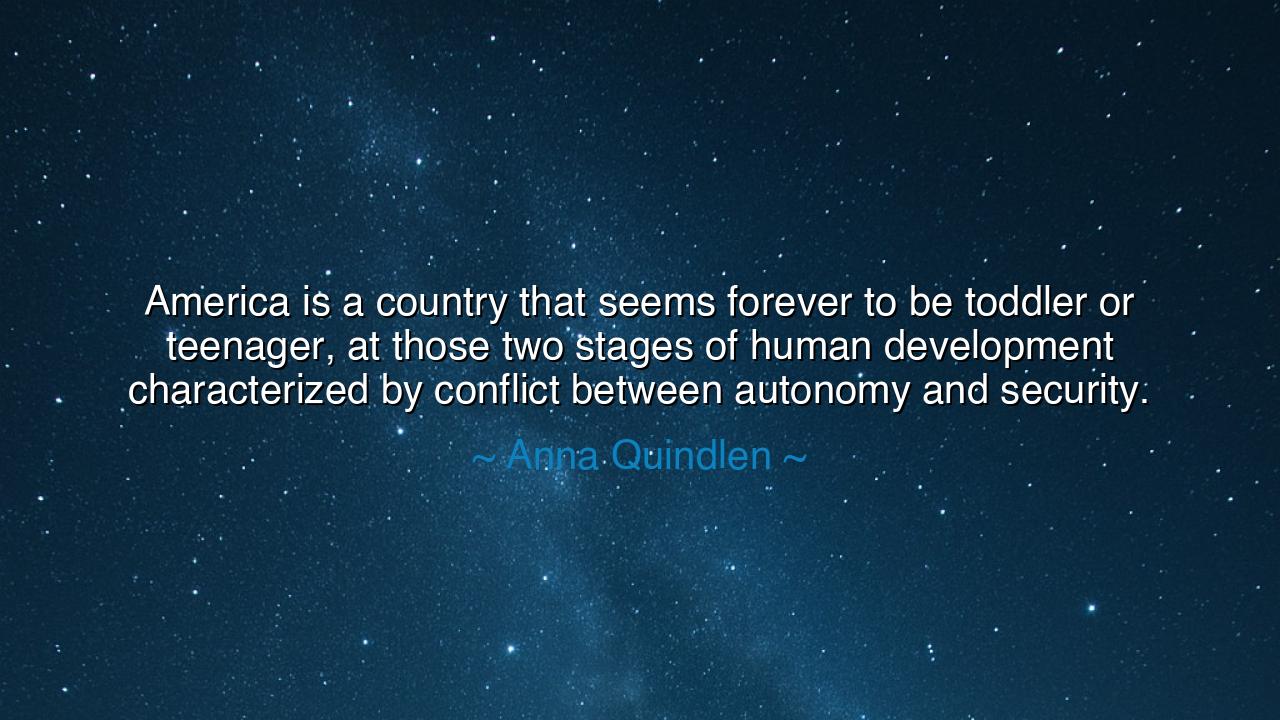
America is a country that seems forever to be toddler or
America is a country that seems forever to be toddler or teenager, at those two stages of human development characterized by conflict between autonomy and security.






Hear now, O children of wisdom, the words of Anna Quindlen, who speaks with the clarity of one who has seen the struggles of nations and individuals alike: "America is a country that seems forever to be toddler or teenager, at those two stages of human development characterized by conflict between autonomy and security." In these words, Quindlen reveals a truth that resonates through the ages—the tension between the freedom to act independently and the need for safety and protection. America, like a growing child, has long struggled with this balance, torn between the desire for autonomy and the need for security in a world that constantly shifts around it.
The toddler, O children, is a creature of pure instinct, driven by the primal need to explore and assert independence. The child at this stage seeks to learn and grow, to act without fear, to test boundaries and claim the world as their own. But in their autonomy, they also require the protection of their caregivers, the security that ensures they do not stumble too far into danger. Similarly, America, in its early years, sought to assert its autonomy, to break free from the shackles of colonial rule and carve out its own place in the world. Yet, as a young nation, it also sought the security of borders, the protection of its ideals, and the strength of a government to preserve its freedom. This tension between autonomy and security has been present from the very birth of the nation.
Consider, O children, the birth of America itself, when the colonies rose up against the British Empire in the American Revolution. The desire for independence was clear—America sought to assert its autonomy, to stand as a sovereign nation, free from foreign rule. Yet, even as the colonists fought for their freedom, they recognized the need for security—the protection of their land, their people, and their new government. The revolution was not just about freedom from tyranny, but about the creation of a system that would provide security and stability. The founding of America was a delicate dance between asserting independence and ensuring the safety of the fledgling nation, a struggle that has continued throughout its history.
As America grew into a teenager, the conflict between autonomy and security became even more pronounced. In its early years, the United States sought to expand its territory, to manifest its destiny, but this expansion often led to conflict. The country pushed westward, yet with each new acquisition, it faced new challenges—issues of slavery, statehood, and foreign relations. Like a teenager, the nation yearned for autonomy, the freedom to make decisions without interference, but it also required the security that comes from a strong system of governance, laws, and protections. The Civil War itself was, in many ways, the culmination of this tension—the battle between the desire for states’ rights (and therefore autonomy) and the need for a unified nation (and thus security).
In more recent history, the Cold War was another manifestation of this struggle. America stood at the forefront of the world stage, asserting its autonomy as a beacon of democracy against the spread of communism. But, as a nation, it was often forced to balance this autonomy with the need for security—security not only within its own borders, but in its relationships with allies, and its response to global threats. The Vietnam War, the Cuban Missile Crisis, and other moments in history demonstrate how America, in its pursuit of independence, faced the difficult reality that sometimes, security must be sought at a great cost.
The lesson here, O children, is both timeless and immediate: autonomy and security are two forces that must always be held in balance. To pursue one without the other leads to danger and instability. America, like a young nation, has continually struggled with this delicate equilibrium. But the wisdom of history teaches us that both autonomy and security are necessary for the well-being of any society. The drive for freedom must be tempered with the wisdom of knowing when and how to protect what we hold dear. This balance is the foundation of liberty and justice.
Therefore, O children, let us seek to live lives where autonomy is never pursued at the expense of security, and where the freedom of the individual is always safeguarded by the wisdom of community and law. America teaches us that the tension between these two forces is not a weakness, but a sign of a growing, maturing society—one that understands that true freedom can only exist when it is protected, and that independence can only flourish when there is a foundation of safety. Let us, too, find this balance in our lives, so that we may rise as individuals and as a society, strong in our autonomy, yet wise enough to preserve the security that allows our freedoms to endure.






AAdministratorAdministrator
Welcome, honored guests. Please leave a comment, we will respond soon